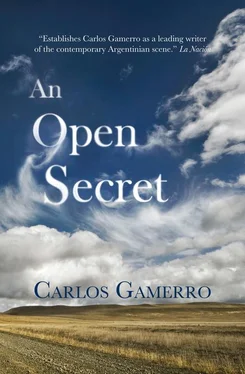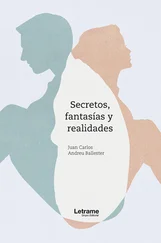“They wasted him didn’t they? Ain’t that enough?”
“Neri I mean. He practically alerted him to the fact.”
“See Licho? Ain’t that what I’ve always been telling you?” Then back at me, “The Super wanted to save him if you ask me. If he’d skedaddled to Buenos Aires or Rosario or even Alcorta he’d’ve been out of our jurisdiction and we couldn’t’ve laid a finger on him. If the military or provincial headquarters found out Neri was going to be in a right fucking pickle, but there you are. He was up a what’s it called a cul-de-sac but he was even willing to run that risk long as it gave the lad a chance. But it’s no use with some people right Don? There’s no way to make them understand,” Carmen Sayago will say with a broad grin, which given his lack of teeth looks heroic at least. “’Nother round Maestro?”
“Nene,” I’ll bark. “Keep an eye out for my friend’s throat over here, don’t let it get dry will you.”
THE GATHERING AT LOS TOCAYOS BAR has stretched into the small hours, as we await the ex-policeman, who always ends up standing us up. Guido left a while ago to answer the call of his occupied bed; Don León Benoit and the bar’s landlord muttered their vague farewells and retreated too, one to the catacombs of the premises, the other to the biting cold of the street. That leaves Iturraspe, who’s got nothing better to do, Licho, living in hope of scoring another drink; Nene rock-steady as ever at the counter, and myself. Then one of the doors onto the main street opens — enter a fat man with long curls and a moon face as white as an unbaked pie crust, his eyes and mouth looking for all the world like the slits in the dough. We’re introduced, Bartolo someone-or-other, currently employed at the Tuttolomondo factory, pasta-nests department, and once he’s drawn up a chair they put him in the picture. “Sayago,” he laughs hoarsely with a triple shudder of his double chin, “good thing he didn’t show up, he’s on my blacklist he is, one of these fine days I’m going to cut him into little pieces. Fancied my ladyfriend he did and chucked me in the can to get me out of the way, the royal sonofabitch, came looking for me at the Sucundún on my birthday, ’cause we was drunk according to them but it was ’cause once I was eighteen they didn’t have to report to the juvenile judge. Couldn’t wait another day he couldn’t so I copped a beating with sticks and boots, lovely present, and to cap it all he locked me up with the vice cons he did who didn’t fuck me by this much,” he says bending his index finger inside his thumb to illustrate. “That’s an easy one”—he answers Nene’s question—“eighteenth of December nineteen seventy-eight. I’ll never forget it as long as I live, nor’ll he, since he stopped being a cop I lay him out flat once a year, out of principle. I’m told he takes a detour all the way round the block just to avoid going past the factory door. Anyway I got off lightly all in all, I mean look what happened to Ezcurra. You related or something?” he asks me and I say, “No.” “Friend of Guido’s,” Iturraspe explains, and Gordo Bartolo says, “Oh right”—pat on the shoulder—“if you’re a friend of the little boss’s say no more. Oh so you’re the one who’s going to make the movie”—he looks at Licho, then at me to seek confirmation—“if you need someone to play the lead look no further. The Ezcurra business you mean? Well not much, just what anybody knows, they locked me up in Greco’s day and that all happened before. What was him before Greco called? He had to be taken down a peg or two for sure but they went over the top. A good hiding would have done I say, no need to go that far. They showed no mercy did Rosas Paz and Echezarreta, took full advantage of the fact they had a free hand.”
“Who?” I take a moment to ask, long enough to register Nene, Iturraspe and Licho’s panic-stricken exchange of glances.
“The Rosas Pazes were the biggest ranchers in the area, not any more, and the Echezarretas—”
“I know who Echezarreta is,” I interrupt sharply. “What I want to know is what … why you said he … that Rosas Paz and he …” I’ve suddenly developed a stutter as my arse rises off the seat of its own accord.
El Gordo realises something’s wrong, the eyes of his acquaintances confirm it but can’t explain what. With a shrug of his shoulders, as if to say too late to turn back the clock, he waits for me to sit back down before he answers:
“Couldn’t abide Ezcurra Echezarreta. That’s common knowledge isn’t it?” he asks his table companions. “I don’t know if it was the other one’s idea or his, but when Neri came up with that plebiscite on Ezcurra our beloved mayor was one of the most enthusiastic defenders of the yes vote. And if you don’t believe me ask Sacamata what he went to buy from him a few days later. Champagne. The mayor sent out for a box of champagne. What were they celebrating? Wasn’t Christmas or New Year or anybody’s birthday. Find who drank those six bottles of champagne and you’ll find who killed Ezcurra, or who wanted him dead at least.”
“AND WHAT ELSE was he going to tell me?” I answer in exasperation. “He knows I’m his grandson. What else was he going to say? Yes, I sold him the champagne, a box of Chandon Extra Brut seventy-seven?” We’ve just left Don Alfredo Sacamata’s general stores-cum-minimarket, we walk down the sidewalk under the cowering, indecisive sun, nodding to the greetings of acquaintances, most directed at Guido but a few by now evidently at me as well.
“Fefe”—Guido tries to calm me down—“why believe Gordo Bartolo over him? I’ve told you, Gordo’s a nasty piece of work, I’ve already had a word with my old man a couple of times to give him his cards, sets himself up as a union delegate he does and fills the others’ heads, but my old man says he prefers him because he’s a fraud and at the end of the day he can be bought unlike someone who takes it seriously …” He pauses realising the gist of his obsessions has led him away from my own.
“It’s all right, Sacamata probably said he doesn’t remember to protect me, or to cover my grandfather, or himself. Supposing there was no box of champagne. That it’s just another piece of Malihuel folklore. My grandfather didn’t toast with champagne, he toasted with a bottle of Chianti he’d been keeping for the occasion since his last trip to Europe. What’s not in doubt is that he was one of those who sent Ezcurra to the wall right? The whole town knew and tried to hide it from me. Isn’t that right? You too.”
Guido walks beside me but doesn’t reply.
“YOU’RE SURE, you’re dead sure, he doesn’t know I’m Echezarreta’s grandson?” I grill Guido and let go of his arm when I notice him wince in pain.
“Yes Fefe, I’ve told you,” he answers wearily. “And I’ve told you what I think. Why don’t you leave things the way they are?”
“Because things are for shit the way they are. Come on, let’s just ring now we’re here.”
“Here” happens to be the neighbouring town of Elordi, where Professor Alfio Scuppa, erstwhile head of Fiscal School № 16, which included the high school too in those days, has retired to enjoy — so to speak — his autumn years in the company of his children, who at least as many years ago again left Malihuel in search of broader, or at least more lucrative, horizons. The house, with its flat corrugated-iron roof, its white stippled plasterwork and its railings of iron lozenges, is not unworthy of the prosperous architectural and phonic ugliness of Elordi, which, rather than a typical rural town, looks like a chunk of suburbs transplanted en masse to one of those points of the pampas whose only distinguishing features are latitude and longitude. I ring the bell once, twice, three times, with no result, not even the muffled echo of the ring from inside; having more local expertise than myself, Guido claps, listens, warns me he’s half deaf the old man is, claps again until the door opens noiselessly and through the crack a tiny flap-eared old man with a blotchy face like a Jackson Pollock done in melanin on parchment pokes his head out. How angry I am, I think to myself.
Читать дальше












